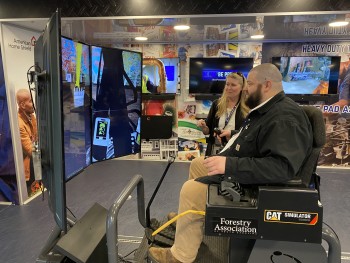(Myrtle Beach, S.C.) This morning, I operated a forklift, covered a trench with an excavator and navigated an 18-wheeler through a suburban neighborhood. I did all of this while sitting in a trailer outside the Myrtle Beach Convention Center.
Be Pro Be Proud South Carolina brought its roadshow to the annual convention of the National Rural Economic Developers Association (NREDA) (NTCA holds a seat on the board NREDA, which is dedicated to growing economic development in rural spaces and which hosted its annual meeting this week).
Be Pro Be Proud has virtual learning centers in about a half-dozen states. Following the 2016 creation of a workforce initiative by the Arkansas Chamber of Commerce, Be Pro Be Proud launched its first mobile training center in 2019. These custom-build units are housed in large trailers and feature simulators for a variety of industries that can include telecom, construction, welding, transportation and fabrication. Many of the simulators feature haptic technology so, if you are operating a virtual excavator to trench fiber, your seat will tilt and buck if the bucket hits virtual rough ground.
Like the NTCA/National Rural Education Association BOLD toolkit to raise awareness of telecom careers among K-12 students, Be Pro Be Proud endeavors to share information about skilled trades and other hands-on careers without necessarily trying to steer rural students onto those pathways. As one rep said this morning, students should be encouraged to pursue whatever calling meets their skills and needs, but they should always be aware of all the opportunities that are available to them. Paraphrasing, he said, “You can certainly get that degree in history, just know that we’ve got good paying jobs waiting for you here.”
This approach echoed a panel presentation in which I participated earlier this week that was hosted by the National Academies. The discussion was part of their “K-12 STEM Education and Workforce Development in Rural Areas” report, which mirrors a renewed national interest in promoting career pathways in science and technology. For rural students, these avenues are expanding as technology becomes increasingly embedded in sectors that include agriculture, manufacturing and healthcare. A recent U.S. Department of Education report explains that rural students account for approximately 19% of all U.S. public and high school students, but that rural students have less access to STEM opportunities than urban or suburban students. Of course, rural schools can rely on NTCA members’ networks to deliver remote advanced remote STEM instruction to areas where local school economics cannot support specialized instruction. (This interview with my co-panelist Dr. Pam Buffington, shares inspiring and eye-opening examples). Industry, as well (including telecom, the trades and other sectors) can coordinate to support post-secondary pathways including internships and “learn and earn” opportunities. Industry can also work with high schools and post-secondary schools, including community colleges, trade colleges and four-year colleges to promote micro-credentialing opportunities. And, of course, NTCA’s work with Northwood Technical College’s Broadband Academy provides an “at your own pace” credentialing program that combines online instruction with mentored apprenticeship-type experiences at NTCA member companies.
None of this is news. NTCA has been exploring these issues for several years, including this report on how broadband can assist educational development and this issue brief on workforce development. What is newsworthy, however, is the increasing amount of attention that is being paid to these issues by industry and government. Part of the renewed commitment to hands-on jobs stems from college expenses and college loan deferral programs; other reasons include evolutions in traditional industrial sectors that are incorporating greater amounts of broadband and other technologies. And the wages are attractive, too. A Go Pro Go Proud rep this morning talked about a 20-year-old man who is earning $78,000 after working through their program and a 24-year-old who is commanding $140,000 annually. “We are here to show students opportunities,” he explained.
(My first-out performance on the excavator was less than stellar; I did better on the 18-wheeler. Next time, I’ll try my hand at welding. Don’t worry, it’s virtual.)
NTCA is available to assist our members as they work with local school districts to promote broadband career job awareness. Please contact the author at [email protected] for more information.


